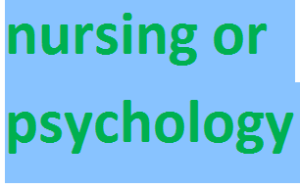nursing or psychology 2024-2025
nursing or psychology 2024-2025

The primary responsibility of a nurse is to support and care for their patients. However, in order to do so, we need to comprehend and evaluate the thoughts and feelings of their patients in order to determine the most effective means of meeting their requirements and desires.
We nurses regularly apply psychology to our work, whether we are aware of it or not, to enhance our bedside manner and foster stronger workplace connections. A look at some nursing careers that make use of psychology knowledge and skills, as well as the reasons why psychology is important in the nursing field, can be found here.
The Importance of Psychology in Nursing As a nurse, you are responsible for more than just the physical health of your patients. You can build trust with your patients and provide emotional and mental support by utilizing some fundamental psychology principles.
When a patient is dealing with a serious or chronic illness, this is especially crucial. They will feel more at ease with treatments or tests if they have faith in you and a sense of psychological safety, which will make the situation easier for everyone involved.
Psychology is also very important to nurses. Many of us work in high-stress environments, so being able to relax so that you can focus on your work is important for your patients, coworkers, and mental health.
The Application of Psychology to Nursing Charting and answering call bells are only two aspects of nursing. Frequently, you are required to act as the patient’s advocate and support system. It is of great assistance to our patients to have a fundamental comprehension of the feelings and mental processes they may be going through during their stay. The following are some advantages of applying psychology to the nursing profession:
1. Better Interactions With Patients
- If you follow the best practices in psychology, you can treat patients of all ages, genders, and backgrounds with greater success. You can use psychology to help your young patient feel more at ease because, for instance, children might be afraid to interact with adults they don’t know.
- Getting your patients to trust you can make a big difference in the quality of their care and how quickly they recover. They will have an easier time communicating with you, expressing their requirements, and adhering to your instructions.
2. Proper Patient Assessments
- Patients sometimes have trouble saying what they’re feeling in the right way. Alternately, they might even attempt to conceal how they actually deal with a diagnosis. It’s critical that you can assess your patients’ emotional well-being. This helps you make better decisions about how to treat them.
3. More Efficient Care Plans
- Anxiety and depression, for example, can have an effect on a patient’s physical recovery. Apathy can impede treatment, stress can raise blood pressure, and misery can cause insomnia.
- For instance, a patient with high blood pressure appears to only require blood pressure medication on the surface. However, the high vital sign may be primarily attributable to their anxiety. Or perhaps you believe you have a quick fix for a patient’s health issues, but you haven’t addressed the patient’s underlying desire to improve.
- A patient’s physical and emotional health are frequently intertwined, so when developing a care plan, you must take into account both.
4. Stronger Communication Skills
- An understanding of psychology is necessary for nurses to be able to address and respond to sick patients, which is an important quality.
- A patient may become agitated, for instance, when they are in pain. You will want to do everything in your power to reduce the pain and calm the patient without being hostile. Another possibility is that your patient is worried about a upcoming procedure. You need to make it clear to them what to expect in a way that calms their worries and provides support.
Click here for South African Nursing Colleges and Schools Application 2023-2024
RELATED LINKS